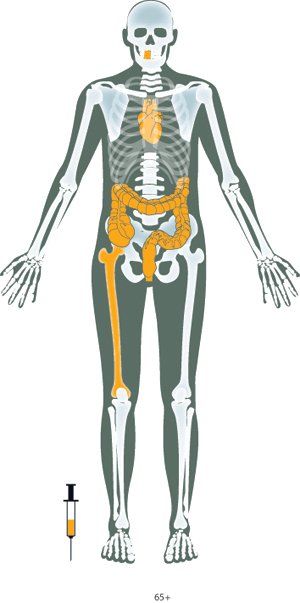
AAA ULTRASOUND
The USTPF recommends an ultrasound test for abdominal aortic aneurism (an abnormally large or swollen blood vessel in your abdomen) for men between the ages of 65 and 75 who have ever smoked.
VACCINES
The ACIP recommends that you get a pneumonia shot once after you turn 65 and that you continue getting seasonal flu shots annually. Also, make sure to get the shingles vaccine if you haven't already.
BONE DENSITY
The USPSTF recommends that women get their bone density checked routinely to screen for osteoporosis starting at age 65.
HEART HEALTH
The USPSTF recommends that you get your blood pressure checked regularly.
COLON-CANCER SCREENING
You can stop getting screened for colorectal cancer at age 75, says the USPSTF.
PAP SMEARS
The USPSTF recommends that women older than 65 stop getting Pap smears-unless you have a history of abnormal results or are at increased risk.
MAMMOGRAMS
Women can stop getting mammograms at age 74, says the USPSTF.
ORAL HEALTH
At this stage in life, risk for tooth decay increases again, says an spokesperson. Less saliva production (dry mouth) and aging fillings and crowns contribute to this. Continue flossing often, brushing twice a day and seeing the dentist regularly.

SECOND OPINION | PROSTATE CANCER
Prostate cancer screening in men under 75 is nearly as controversial as mammograms for women under 50, and if you doubt it, check out the title of a new book: Invasion of the Prostate Snatchers. The authors argue that the disease can often be treated as a chronic ailment and that zealous doctors are over-diagnosing and overtreating it. Some tumors do stay indolent for years or even decades, but others can be deadly; prostate cancer kills 27,000 men every year. So should you be regularly screened with a digital rectal exam and/or PSA test, or not?
The U.S. Preventive Services Task Force says no (and definitely not if you're over 75). The American Cancer Society says, essentially, "maybe." It recommends that starting at 50 (when prostate-cancer risk begins to rise), men make an informed, personal decision.
There's no solid evidence that early detection lowers the prostate cancer mortality rate. Deaths have dropped since the 1990s, but that may be because of better treatment, not widespread screening.
Neither digital rectal exams nor PSA tests are 100 percent accurate. Both tests can indicate cancer where there isn't any, leading to un-necessary and painful biopsies. Or they can miss real tumors, giving men an unwarranted sense of security. The PSA test also doesn't tell you if your cancer is actually dangerous-and having a (potentially benign) tumor removed can cause incontinence and impotence. Whether you want to risk that is up to you.
Research by Ian Yarett
Healthy Living: The Complete Package
Uncommon Knowledge
Newsweek is committed to challenging conventional wisdom and finding connections in the search for common ground.
Newsweek is committed to challenging conventional wisdom and finding connections in the search for common ground.
About the writer
To read how Newsweek uses AI as a newsroom tool, Click here.





